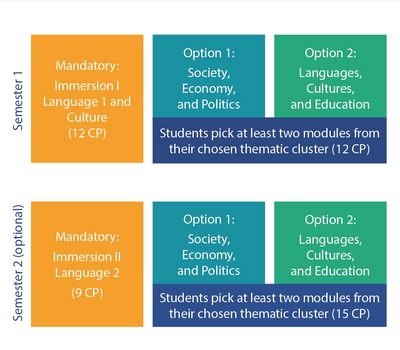Structure and Syllabus
Winter Term 2024/25
*Please note that the course catalogues are still subject to change. Courses and details will be added within the next few weeks.
Archive: Course Overviews
Summer Term 2024 Cluster 1 (pdf)
Summer Term 2024 Cluster 2 (pdf)
Winter Term 2023/24 Cluster 1 (pdf)
Winter Term 2023/24 Cluster 2 (pdf)
Summer Term 2023 Cluster 1 (pdf)
Summer Term 2023 Cluster 2 (pdf)
Winter Term 2022/23 Cluster 1 (pdf)
Winter Term 2022/23 Cluster 2 (pdf)
Summer Term 2022 Cluster 1 (pdf)
Summer Term 2022 Cluster 2 (pdf)
Winter Term 2021/22 Cluster 1 (pdf)
Winter Term 2021/22 Cluster 2 (pdf)
Summer Term 2021 Cluster 1 (pdf)
Summer Term 2021 Cluster 2 (pdf)
Winter Term 2020/21 Cluster 1 (pdf)
Winter Term 2020/21 Cluster 2 (pdf)
Summer Term 2020 Cluster 1 (pdf)
Summer Term 2020 Cluster 2 (pdf)
Winter Term 2019/20 Cluster 1 (pdf)
Winter term 2019/20 Cluster 2 (pdf)
Summer Term 2019 (pdf)
Summer Term 2018 (pdf)
Winter Term 2017/18 (pdf)
Module Syllabus
Structure and Syllabus
General Structure
According to your individual preferences, you can opt for modules in one out of two thematic clusters: "Society, Economy, and Politics" or "Languages, Cultures, and Education."
In your chosen cluster, you will have to study at least two modules per semester and acquire at least 12 CP in the first and at least 15 CP in the second semester.
Additionally, you will study an introductory module, which consists of language course 1 and an introductory seminar on Germany in the first (12 CP) and language course 2 in the second semester (9 CP).
After successful completion, you will be awarded a certificate.
Thematic Options in Detail
Society, Economy, and Politics
In this cluster, students can deepen their knowledge on the processes of globalisation and European integration that transform the society and economy in Germany and other parts of Europe, affecting the systems of politics and law. Students can choose from a wide range of modules in the social sciences, i.e. from sociology, political science, economics, business & management, and law. Most of the lectures provide profound background knowledge in an international setting or a comparative perspective. In many of the seminars the focus is set on topical issues such as climate change, financial crises, migration and demographic change, transnational regimes of trade and production, and conflicts related to nationalism and terrorism. Some of the courses specialise on the social, economic and political situation in Germany.
Languages, Cultures, and Education
In this cluster, students can explore Europe/parts of Europe as multilingual and culturally diverse regions both in present and in historical settings. They can explore the histories of language and cultures in different European countries, while, at the same time, reflecting on the transnational dimension of linguistic and cultural developments, also taking the global entanglements of Europe (both today and in the past) into account. Moreover, students will have the chance to reflect on the role of (primary, secondary, tertiary) education in these highly diverse contexts, e.g. by developing a comparative perspective including their own country of residence. Course topics include (but are not limited to) phenomena of multilingualism in European contexts, the history and reverberations of European colonialism, Europe and/in processes of globalisation (e.g. in popular culture), migration and forms of cultural mobilities to, from, and within Europe.



